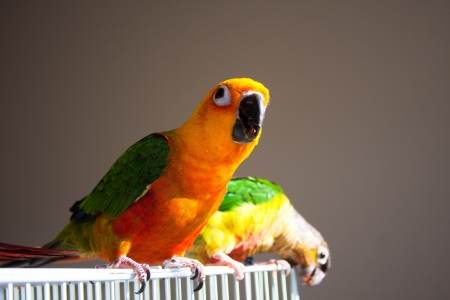Introduction to Popular Pet Birds in the UK
If you’ve ever enjoyed a quiet stroll through a quaint British village or lingered over a cup of tea in a friend’s conservatory, you might have noticed the gentle chatter of pet birds echoing from cosy homes. Across the UK, bird-keeping has blossomed into a much-loved tradition, with pet owners relishing the charm, companionship, and vibrant personalities that feathered friends bring into their lives. Whether you’re living in a bustling London flat or a country cottage in the Cotswolds, there’s something quintessentially British about sharing your home with a clever budgie or an elegant cockatiel.
But what makes certain pet birds especially popular among British owners? It often comes down to temperament, ease of care, and how well they adapt to our unique climate and lifestyles. Some birds delight us with their colourful plumage, others with their delightful songs, while many become treasured family members thanks to their affectionate natures.
Here’s a quick snapshot of what draws UK pet lovers to their favourite avian companions:
| Bird Type | Why Theyre Popular in the UK |
|---|---|
| Budgerigars (Budgies) | Cheerful, easy to train, and perfect for smaller homes |
| Cockatiels | Sociable personalities and relatively low maintenance |
| Canaries | Beloved for their melodious singing |
| Lovebirds | Affectionate pairs that thrive on interaction |
This guide is your passport to discovering the top 10 most popular pet birds across Britain—whether you’re dreaming of your first feathered companion or are already a seasoned bird enthusiast. Join us as we explore each species’ unique quirks and what makes them such cherished members of British households!
2. Key Considerations Before Choosing Your Feathered Friend
Before bringing a new bird into your home, it’s vital to weigh up several key factors to ensure both you and your future feathered companion will be happy together. Pet birds can be delightful, but they’re also a long-term commitment—so let’s explore what every British owner should consider.
Space Requirements
Unlike dogs or cats, birds need ample space not just for their cages but for daily exercise and flight time. Whether you live in a cosy London flat or a countryside cottage, ensure you have enough room for your chosen species.
| Bird Type | Minimum Cage Size | Recommended Free-Flying Time |
|---|---|---|
| Budgie | 60 x 40 x 40cm | 1-2 hours/day |
| Cockatiel | 75 x 45 x 45cm | 1-3 hours/day |
| African Grey Parrot | 90 x 60 x 120cm | 3-4 hours/day |
Care Commitment & Lifespan
Caring for a pet bird involves more than topping up seed and water. Birds require social interaction, mental stimulation, regular cleaning, and sometimes even specialised veterinary care. Some species can live as long as 50 years or more—are you ready for that journey?
| Species | Average Lifespan (UK) | Daily Care Level |
|---|---|---|
| Canary | 10-15 years | Low-Medium |
| Cockatiel | 15-20 years | Medium |
| African Grey Parrot | 40-60 years | High |
Legalities & Ethical Sourcing in the UK
The UK has strict regulations regarding the keeping of exotic birds. Always check if your chosen species requires a licence under the CITES Agreement (Convention on International Trade in Endangered Species). Additionally, always purchase from reputable breeders or adopt from rescue organisations to ensure ethical sourcing and animal welfare.
Lifestyle Compatibility: Is a Bird Right for You?
Your work schedule, travel habits, noise tolerance, and even allergies all play a part in choosing the right pet bird. For instance, parrots can be quite vocal, while finches are more discreet companions—pick a species that suits your daily rhythm.
Selecting the right pet bird is about matching your lifestyle with your avian friend’s needs. By considering space, commitment, legalities, and compatibility, you’ll set the stage for a rewarding relationship with your new companion—British style!
![]()
3. Top Pet Bird Breeds Loved by Brits
Britain’s love affair with pet birds is as charming as a stroll through Hyde Park with a feathered companion on your shoulder. From the chirpy to the chatty, here’s a showcase of the UK’s most sought-after pet bird species, highlighting local favourites and the unique quirks that make each breed special.
Most Popular Pet Birds in the UK
| Bird Breed | Why Brits Love Them | Quirky Traits |
|---|---|---|
| Budgerigar (Budgie) | Affectionate, easy to care for, ideal for beginners | Mimics British accents, cheeky personalities |
| Cockatiel | Gentle nature, low maintenance, great with families | Loves whistling classic tunes like “Rule Britannia” |
| African Grey Parrot | Exceptionally intelligent, brilliant talkers | Keen on picking up local slang, witty banter guaranteed |
| Canary | Songbird tradition since Victorian times, uplifting melodies | British canaries bred for unique regional songs |
| Zebra Finch | Lively flocks, easy to keep in pairs or groups | Tiny size, but big personalities—loves group nattering! |
| Lovebird | Adorable duos, symbolise romance and companionship | Spoilt with British treats—sometimes seen sharing fruit tea! |
| Parakeet (Ring-necked) | Colourful addition to homes and gardens alike | Mischievous streak; some have made London parks their home! |
| Amazon Parrot | Loyal companions for seasoned bird owners | Sings along to football chants on match days |
| Bourke’s Parrot | Calm and gentle, suited for quieter households | Clever at sneaking out at teatime for extra attention |
| Kakariki (New Zealand Parakeet) | Active and playful, perfect for energetic families | Loves a good hop across the living room carpet! |
A Unique Blend of British Flair and Feathers
The UK’s bird lovers have a penchant for breeds that not only fit well into the quintessential British lifestyle but also add a spark of personality to their homes. Whether it’s a budgie showing off its new Cockney accent or a canary filling your morning with song, these birds are more than pets—they’re proper members of the family! Each breed brings its own set of endearing habits and delightful eccentricities, ensuring there’s a perfect avian companion for every type of British household.
Your Next Feathered Adventure Awaits!
If you’re pondering which bird might best suit your tea times and Sunday roasts, let this guide be your starting point. Up next: tips on choosing the right bird for your lifestyle—and how to give them the royal treatment they deserve.
4. Understanding Bird Care: British Essentials
When welcoming one of the UK’s favourite pet birds into your home, understanding their unique care requirements is essential—especially given Britain’s ever-changing weather and local resources. Here are some vital tips to ensure your feathered friend thrives, from diet to healthcare.
Adapting to the UK Climate
The British climate is famously unpredictable, with chilly winters and damp spells. Most pet birds, such as budgies or cockatiels, do best in a stable indoor environment away from draughts and direct sunlight. Ensure your bird’s cage is placed somewhere warm and sheltered, maintaining a consistent temperature between 18–24°C. During colder months, consider adding cage covers at night or using a safe heating lamp designed for avian use.
Diet Options: British Favourites
A balanced diet is key to keeping your pet bird healthy. While commercial seed mixes are widely available at UK pet shops, supplementing with fresh fruit and veg helps mirror their natural diet. Below is a handy table outlining suitable foods commonly found in British supermarkets:
| Bird Species | Main Diet | Treats & Supplements |
|---|---|---|
| Budgerigar | Seed mix, millet spray | Apple (no seeds), broccoli, spinach |
| Cockatiel | Pellets, seeds | Carrot, sweetcorn, dandelion greens |
| Canary | Canary seed mix | Kale, cucumber, boiled egg (in moderation) |
Important Note:
Avoid giving birds avocado, chocolate, or anything salty or processed—these can be toxic!
Access to Local Avian Vets and Pet Shops
Britain boasts a vibrant network of avian specialists and well-stocked pet shops. For regular check-ups or emergencies, search for “avian vet near me” or ask fellow bird owners for recommendations via online forums like The Parrot Society UK. Local chains such as Pets at Home often carry everything from specialist foods to cage accessories. Don’t forget to register your bird with a vet soon after bringing them home for peace of mind.
Your Local Birdie Adventure Awaits!
Caring for a pet bird in the UK is truly rewarding—and with the right know-how about climate, diet, and local services, you’ll be ready for many happy years together exploring every chirpy moment.
5. Bird Welfare and Responsible Ownership in the UK
Keeping pet birds in the UK is a rewarding journey, but it comes with important responsibilities. As British bird lovers, we are guided by some of the world’s highest animal welfare standards, ensuring our feathered companions lead healthy and happy lives. Here’s your essential guide to best practices and your legal obligations as a responsible bird owner in Britain.
Understanding UK Animal Welfare Laws
The Animal Welfare Act 2006 sets out clear duties for pet owners in England, Scotland, and Wales. Owners must provide their birds with:
| Welfare Need | Example for Pet Birds |
|---|---|
| A suitable environment | Spacious cage or aviary, away from draughts and hazards |
| A suitable diet | Species-appropriate seed mix, fresh fruit, vegetables, and clean water |
| The ability to exhibit normal behaviour patterns | Perches, toys, space for flight, social interaction |
| Housed with or apart from other animals as appropriate | Pairing social species; separate housing for solitary types |
| Protection from pain, suffering, injury, and disease | Regular vet checks, clean living conditions, prompt treatment when ill |
Best Practices for British Bird Keepers
- Cage Size: Always select the largest cage you can accommodate—“budgie mansion” over “bird bedsit” every time!
- Diverse Diet: Supplement seeds with leafy greens and occasional treats like millet sprays.
- Mental Stimulation: Rotate toys regularly and offer safe branches for perching and chewing.
- Social Needs: Some birds thrive on companionship; consider keeping pairs or groups where suitable.
- Health Checks: Register with an avian vet and schedule annual check-ups—prevention is better than cure!
- Lifestyle Commitment: Remember that parrots and other exotics may live for decades—this is a lifelong adventure.
UK Organisations Supporting Responsible Bird Keeping
| Organisation | Role/Services Provided |
|---|---|
| The RSPCA (Royal Society for the Prevention of Cruelty to Animals) | Guidance on welfare standards, rescue services, educational resources |
| The Parrot Society UK | Advice on parrot care, rehoming services, responsible breeding guidelines |
| The British Trust for Ornithology (BTO) | Pioneering research into wild and captive bird welfare in the UK |
| The Animal Welfare Foundation (AWF) | Educational campaigns on best practices in pet care including birds |
Your Adventure as a Responsible Bird Owner Awaits!
Caring for one of the UK’s top 10 popular pet birds isn’t just about enjoying their colourful company—it’s about upholding a proud British tradition of animal welfare. From budgies in Birmingham to cockatiels in Cornwall, let’s keep our feathered friends chirping happily ever after under the Union Jack!
6. Life with Birds: Tips for Happy Homes and Happy Beaks
Bringing a feathered friend into your British home is an adventure, full of charm, colour, and the delightful chirps of new companionship. But to truly thrive, our avian mates need more than just seeds and a perch – they deserve an environment that’s as lively and enriching as the British countryside itself. Here are some practical insights for daily life with pet birds, ensuring their health and happiness from Land’s End to John o’ Groats.
Enrichment: Keeping Curious Minds Busy
Pet birds are naturally inquisitive and clever creatures, so it’s crucial to keep their environment stimulating. Rotate toys frequently to stave off boredom and introduce items like ladders, swings, and mirrors (but not too many, to avoid confusion). Foraging toys filled with healthy treats encourage natural behaviours – think of them as a puzzle for your bird’s beak!
Popular Enrichment Ideas
| Type of Bird | Recommended Enrichment |
|---|---|
| Budgerigars | Puzzle feeders, millet sprays, bells |
| Cockatiels | Wooden chew toys, rope perches, paper rolls |
| African Greys | Interactive games, talking toys, foraging boxes |
| Canaries & Finches | Swinging perches, leafy greens to peck at, small mirrors |
| Lovebirds & Parrotlets | Nesting material, shreddable toys, climbing nets |
Safe Indoor Spaces: Creating a Cosy Nest
Your home should be a safe haven for your feathered pal. Place cages away from draughts and direct sunlight – a classic British conservatory might look perfect but can get too hot in summer months. Avoid kitchens due to fumes and potential hazards. Always check for toxic houseplants or open windows before letting your bird out for supervised exercise.
Checklist: Bird-Proofing Your Home
- No open flames (candles or cookers)
- No access to electrical cords or small objects that can be swallowed
- Secure all windows and doors when birds are out of their cage
- Avoid Teflon/non-stick cookware fumes which can be fatal to birds
- Keep cleaning chemicals well away from aviary areas
Health & Entertainment: A Recipe for Vitality
A balanced diet is paramount; supplement quality seed mixes with fresh fruit, veg (like carrots or kale), and calcium sources such as cuttlebone. British tap water is generally safe but always change it daily. Regular vet checks (with an avian specialist if possible) catch health issues early. Don’t forget social time—birds are flock animals at heart. Whether you’re sharing a cuppa in the lounge or whistling along to Radio 2 together, interaction keeps them chirpy.
Your Daily Bird Care Routine at a Glance:
| Morning Tasks | Evening Tasks |
|---|---|
| Change water Check food bowls Open curtains for natural light Quick chat & interaction Inspect cage safety |
Remove uneaten food Tidy cage floor Rotate toys/enrichment Quiet time before bed Cover cage if needed for darkness & warmth |
Treat every day with your pet bird as a mini adventure—whether you’re setting up a new play area or introducing a sprig of parsley for them to explore. With a little care and creativity, you’ll have happy homes and even happier beaks across the UK!


